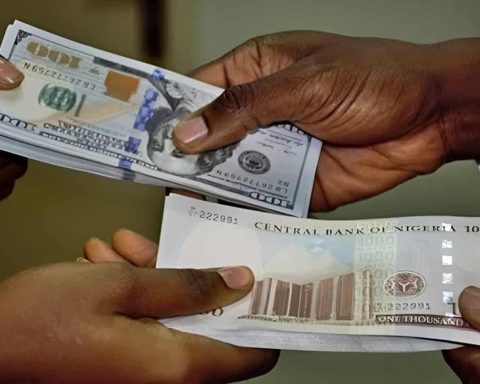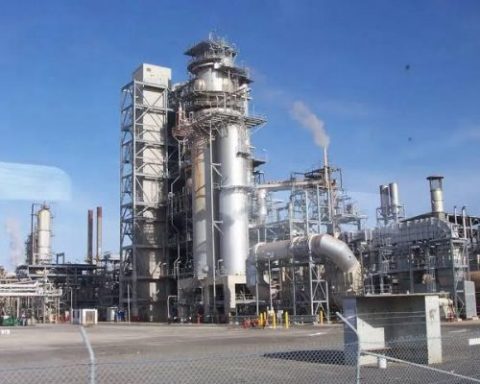The Central Bank of Nigeria (CBN) has keyed into the $1 trillion economy envisioned by President Bola Ahmed Tinubu by 2030. And the global management consulting firm, McKinsey and Co. is sanguine about the economy.
McKinsey had projected that the economy would attain a GDP of $1.6 trillion in 2030 and further noted that the economy would be one of the world’s top 20 economies.
Join our WhatsApp ChannelAlso, the World Bank in its recently published Nigeria Development Update, reported that the economy grew at its fastest by 4.6 per cent year on year in the fourth quarter (Q4) of 2024 and projected a continued expansion at a 3.6 per cent growth in 2025.
Bank recapitalisation is one of the policy highlights of the CBN, which aims to drive the economy towards the attainment of the envisioned USD1 trillion target by 2030.
In a recent press briefing, the Deputy Governor, Corporate Services, CBN, Ms Emem Usoro, said that building a $1 trillion economy was not an easy task.
But she highlighted the strategic importance of the bank recapitalisation towards achieving the vision.
Represented by the Acting Director, Corporate Communications, Mrs Hakama Sidi-Alli, the Deputy Governor noted that “the push for a recapitalisation of banks would no doubt improve the strength and health of the financial system, deepen financial intermediation and promote healthier competition that would strengthen our payment system.”
The bank recapitalisation policy stipulates that banks in the international category would recapitalise with a minimum share capital of N500 billion, national banks would recapitalise with a minimum of N200 billion, and regional banks, N50 billion a minimum share capital.
READ ALSO: Recapitalisation: Banks In Last Lap To Meet Deadline
The previous bank consolidation policy of 2004 enhanced the banking sector and enabled banks to take on big-ticket transactions, which added value to the economy. Prior to that, banks were not adequately capitalised and were unstable, and resorted to the CBN for a bailout and which was a trigger for financial system instability.
Financial system instability is one of the worst things that can happen in an economy because the financial system is the axle on which the economy revolves. Thus, financial system instability would create a domino effect in the economy.
Some of the triggers of financial system instability include capital inadequacy, non-performing loans, under-regulation, liquidity mismatch, global imbalances, contagion, complex equity markets, fall in asset prices, information asymmetries, etc.
Experts have noted that banking crises occurred on average once every 20-25 years, and that the annual probability of a crisis was 4-5 per cent, and that higher capital base and liquidity requirements reduced the rate of bank failure.
READ ALSO: Nigerian Banks Raise N1.27trn In Race For Recapitalisation
In view, the present bank recapitalisation is a proactive and commendable policy which serves as a buffer mechanism that would reinforce financial system stability, power businesses and drive the economy with multiplier effects towards the attainment of the envisioned $1 trillion economy in 2030.
CBN has been diligent in ensuring financial system stability and in the evolution of creative policies that engender macroeconomic stability and growth.
Besides the bank recapitalisation, CBN is also supporting Small and Medium Scale Enterprises( SMEs) through financial inclusion, towards achieving the target $1 trillion economy.
SMEs are engines of economic growth, job creation and poverty reduction.
READ ALSO: Economy And CBN’s Coordinated Strategies
Research shows that SMEs provide 70 percent of jobs and contribute nearly 35 percent of GDP in developing countries.
For a greater impact, Nigeria’s economy needs to be more competitive in the manufacturing sector, through enhanced investments in high skills, innovation ability, research and development, and funding and putting resources in top colleges.
Manufacturing is noted to have the highest employer multiplier effect for the domestic economy.
According to experts, $1 worth of goods manufactured creates another $1.3, and no nation could emerge as an economic power without manufacturing.
CBN has continued to evolve policies that support manufacturing, but it has been noted that manufacturing in Nigeria is dominated by the production of cement, building materials, food and beverages, fertilisers and wood.
And that out of all, only three accounts for 77 per cent of manufacturing output, generating the greatest output.
In a recent remark, the outgoing President of the African Development Bank (AfDB), Dr. Akinwunmi Adesina, emphasised the need for Nigeria to invest in technology and innovation and embrace policies that would drive industrialization and economic diversification.
In an article titled AfDB, African Economies, Insights and Strategies For Development which I wrote and was published in the Thisday newspaper on 6th May 2017 and the Sun newspaper, prior to the 17th Annual Meetings of the African Development Bank in Ahmedabad, India, I noted the need for African economies to transform.
READ ALSO: CBN Unveils Non-Resident BVN, Strengthens Ties With Nigerians In Diaspora
I emphasised the need for African economies to transit from being Factor-driven economies that compete just based on raw materials to Efficiency-driven and Innovation-driven economies that are technology-driven and where growth is based on more efficient production processes, increased product quality, and product diversification.
CBN’s efforts in enhancing financial system stability and with particular emphasis on bank recapitalisation to energise and boost the economy, are highly commendable because in developing countries, bank-based financing is predominant and banks provide the major share of financial services.
But the incorporation, promotion, and elevation of market-based financing would create a greater and maximum impact in the economy because market-based financing has been noted to catalyse industrial growth and enhance economic performance.
Nwobu, a Chartered Stockbroker and Business Journalist, wrote via arizenwobu@yahoo.com Tel. 08033021230.














